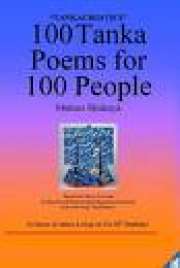|
Biography Keiko Imaoka
Beginner\'s Mind (Keiko Imaoka - Tucson, Arizona)
I cannot be sure when I first became aware of haiku and tanka in my childhood in Japan. They seemed to have existed for a long time in the perimeter of my awareness, undifferentiated from proverbs, mottoes, aphorisms, and song lyrics that were phrased in similar forms. Sometime during my grade school years, \"Ogura Hyakunin-Isshu\" (\"Ogura Collection of One Hundred Tanka\", edited by Teika Fujiwara around 1235) became known to me as a New Year\'s card game, in which players compete to capture shimonoku cards (100 cards on each of which the last half of a verse is printed, spread out on the floor in front of the players) that finish the verses being read aloud. At abacus school, where we played this game at every new year\'s party, my prowess in the game improved dramatically when I was in the sixth grade, after I had memorized all the poems with my tenth-grade sister who was required to do so in her archaic grammar course in school. I had learned to recall each poem by the first few syllables, which enabled me to locate the last parts of the verses quickly.
Although I knew the words to each verse precisely, I had very little idea as to their content at the time. The vocabulary and grammar used in the tanka are so far removed from the modern Japanese language that many of the poems cannot be comprehended without specialized knowledge. In senior high school, we discussed, analyzed, and translated the poems into plain Japanese, just as we did in an English grammar course. Likewise, we labored begrudgingly to translate small portions of \"The Tale of Genji\" and the first paragraphs of Basho\'s haibun, \"Narrow Road to the Far North\", through the course.
For most of us high school kids and other lay readers, haiku and tanka were poems to be appreciated only by reading the accompanying translations and interpretations. These traditional verses seemed boring, irrelevant, and hopelessly old-fashioned to the kids of my generation who were immersed, however unconsciously, in Western culture. They were simply not the genres I could imagine myself writing in at the time. (Contemporary Japanese tankaists use a combination of the modern vocabulary and archaic grammar. In recent years, the emergence of Machi Tawara and other young tanka poets who write about common concerns of youths has done much to promote tanka among the younger generation. Similarly, the popularity of haiku among young women has surged within the past year with the rise of a young poet named Madoka Mayuzumi to celebrity status. Nevertheless, the vast majority of people who practice haiku and tanka are the elderly.)
Many years later in 1992 and a world away, I happened to pick up a library copy of Cor van den Heuvel\'s \"The Haiku Anthology\" and was immediately captivated by the brief, unassuming poems that were supposed to be \"haiku\" -- I did wonder what about the poems made them haiku, knowing that the English language lacked the syllable-based rhythm that is the core of Japanese haiku. There was no specialized vocabulary, no archaic grammar to contend with in English haiku; just simple and plain language that even grade-school kids could understand. I started to write English haiku about my desert surroundings and wildlife, and to translate them into Japanese. Since then, I have also come to appreciate traditional as well as modern Japanese haiku and tanka. One of my first published haiku was about the celestial entity I had never seen while living in Japan.
the Milky Way falling
I think of
starless Osaka nights*
\"Haiku Southwest\", July/October 1993
*This is the haiku printed in \"Haiku World\" by William J. Higginson.
|




